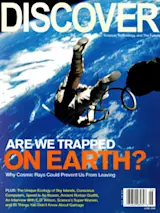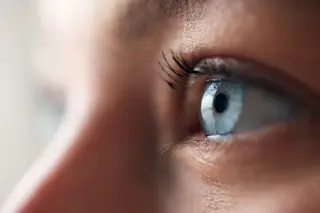In the fall of 2001, five people died after exposure to weapons-grade spores of the Bacillus anthracis bacterium—anthrax—delivered in postal letters. The crime, which remains unsolved, brought national and international attention to the looming danger of bioterrorism and biological warfare.
Future bioterror attacks may be unavoidable, says retired United States Army Colonel David R. Franz, who has spent more than 25 years studying—and preparing medical countermeasures against—biological warfare and bioterrorism. Franz, who worked as a veterinarian before earning a doctorate in physiology, is currently the vice president and chief biological scientist at the Midwest Research Institute. He is the also the first director of the National Agricultural Biosecurity Center. In the late 1990s, Franz served as the chief inspector on three biological warfare inspections to Iraq for the United Nations Special Commission.
During your inspections of Iraq, you found bioweapons.
DF: We did. In that era, 1998, we found them. I don't think it was a high-quality program.
Were you surprised bioweapons weren't found in the recent inspections?
DF: No. Right before we went in the second time, I was on record for both MSNBC and CNN saying that I won't be at all shocked if we don't find biological weapons this time.
It sounds like I had a lot of wisdom, but in my next breath, on MSNBC and CNN, I said that we will absolutely find chemical weapons.
Why hasn't a biological terrorism attack happened?
DF: The hardest question I am asked is why it hasn't happened. It is not necessarily as easy as everyone says. When you work through all the possible scenarios, you find technical difficulties for the bad guys, fortunately. That is why, I think, I'm less concerned about it than [the average person] who just knows that bad things can happen with biology.
I think of a spectrum of technical barriers. On the very low end, something like foot-and-mouth disease in cattle… On the far end of the spectrum there are the classical agents—anthrax, plague, tularemia. There are significant technical issues there.
Why hasn't an attack at the lowest level occurred? That's a behavioral issue, not a technical issue. It is one of intent, it seems to me. And, for some reason it hasn't been done.
Can't we just develop sensors that will detect an attack—anthrax in the air?
DF: If we had that, we might not need to think about vaccines. We would all have a little thing in our pocket or our purse that we could put on to protect our airways. But, I don't think we are going to get there. Biological detectors are complicated. You need antibodies to the bugs, or PCR primers, and the detectors take a lot of care and feeding.
Is there a relationship between emerging disease and bioterror?
DF: Not everyone agrees with me, but I use a very simple equation to think about it: bioterrorism equals emerging infectious disease plus intent.
Could we stop a would-be terrorist if they were intent on causing harm?
DF: I think it would be really tough. If we do, it would likely be through something we pick up in intelligence. We hear something is planned, or someone has this little laboratory in their basement or in a cave somewhere, or we have a scientific colleague, somewhere in the world, working with someone who hears something.
Assuming you can't stop it, then what?
DF: I looked at the bugs and said that for medical countermeasures we can't make a "1-to-N" list and say we are going to go down the list and make a vaccine for each one—there are just too many. So I looked at the [dangerous] outliers.
We now have enough vaccine for smallpox to immunize the population. We have vaccines now for anthrax and antibiotics for anthrax, and we have some stockpiles and a lot of other preparations for foot-and-mouth disease.
Then under that, where we can't afford to do specific countermeasures, I like surveillance, general diagnostics. It is a lot easier to get diagnostics through the FDA. Anything you have to stick into people or that people take orally, there are a lot more hoops to jump through.
And then under that a strong biotechnology and basic bioresearch infrastructure. In the future, I think we'll come up with more generic countermeasures that may boost our immune system a little bit.
How far in the future?
DF: I always say 30 years.
Over the long haul, aren't you going to drive the evolution of the bugs toward being craftier, more resistant?
DF: Probably, to some degree. It depends on the bug.
Is there anything else we can do?
DF: There is no perfect solution. We can't stop a bioterrorist. We might stop some with deterrence, and if it occurs we have these generic countermeasures and a good public-health system, and then for what that can't deal with we need to have our people resilient.
What do you mean by that? Accept that it's going to happen, and just deal with it?
DF: Sort of. Not ever accept terrorism—we're going to do everything we can do to fight this—but be able to deal with it, more mentally than any other way.
I don't think the public would be ready to hear that message. They want to hear that it is not going to happen, and that they're protected if it does.
DF: I think of two examples. One is Israel. They've become a more resilient society. But it isn't by chance. They've focused on education, on understanding terrorism.
And then I remember a snippet of the news I saw after Katrina on the Cajun families out in the rural areas. They just got their boats, their shotguns, checked on their neighbors. They are used to living off the land, and have a close-knit social structure. Those kinds of things can make a great difference. I consider that resilience as well.
Has anyone calculated the odds that an individual person will ever be attacked by a bioterrorist?
DF: You're more likely to be hit by a truck. We lose 440,000 people to smoking related illnesses every year... We lose 20-80,000 people to influenza every year, 120,000 people to automobile accidents. We lose five people to bioterrorism.
I'm sure you know where I'm going: Why spend money on this, which might not ever happen, instead of on these known things?
DF: One reason is that we're willing to let our fellow citizens die if they know it is going to take a long time and they kind of enjoy what leads up to it. Like smoking. We are willing to let people die of influenza if they are old and their immune systems aren't very good and they are probably going to die soon anyway. We are not wiling to have even a very low risk of dying if someone intentionally does it. We can do it to ourselves, but nobody can do it to us.
If you were an ingenious bioterrorist, wouldn't you work on some unexpected, not-so dangerous organism, and make it worse?
DF: The bad news is biology is very squishy; the good news is biology is very squishy. For those of us interested in countermeasures, you think you've got a vaccine nailed, or you think you have the perfect antiviral drug – then you find out it is toxic, or the vaccine protects mice but not primates. Fortunately the same holds true for the person who would use biology against us. You can get a group of experts, molecular biologists, virologists, together in a room and they say "I can do this" but you get in a lab and it is not as easy as in the conference room.
What are you most worried about?
DF: I am probably most concerned about the highly contagious human agents—influenza, smallpox—which could have a huge impact on this world, because the world is smaller and we have HIV/AIDS today.
Why does that matter?
DF: I don't think we would ever eradicate smallpox again, because you couldn't immunize AIDS patients or maybe even HIV patients [because they would be vulnerable to the virus in the vaccine].
The other thing that I worry about a concept called "reload." Say you have two kilos of high-quality, powdered anthrax in ten American cities. It might not be totally efficient but can infect a lot of people. Then you say 'in two weeks, I'm going to do the next city and I won't tell you what it is,' then you do the next city. That is feasible, and would be very hard to deal with.
Because of the injuries or the psychological damage?
DF: If they said 'it's going to be Detroit next,' you could deal with it. If they didn't say [where], it would have a real psychological impact. Would you want to go downtown or anywhere if you knew that there were 10,000 people suffering from inhalational anthrax and a lot of them would die?
If anything is scary to me, it is the contagious agents, because an outbreak can start with such a small group of people and just... go.
DF: I think we would change our lifestyles very quickly. We would probably travel a lot less, we would probably wear masks when we go to the grocery store, we would probably wash our hands a lot more.
How much should we worry about agricultural bioterrorism?
DF: The ag threats fall below the threshold that we might compare to large natural disaster. But foot-and-mouth disease is one I worry about because it could devastate our economy. Foot-and-mouth could take us into tens of billions of dollars of economic damage.
If you rewrite history and the 9-11 attacks never happened, would anyone have thought it likely that planes would be hijacked and crashed into targets? So isn't it possible that future attacks will be things you're not looking for?
DF: Go back to my equation that bioterrorism is emerging infectious disease plus intent. We have a good medical infrastructure and public health infrastructure looking for emerging infectious disease. So I think we're in better shape with regard to biology than we are to the next terror event—someone flying airplanes into bridges, those off-the-wall kinds of things.














